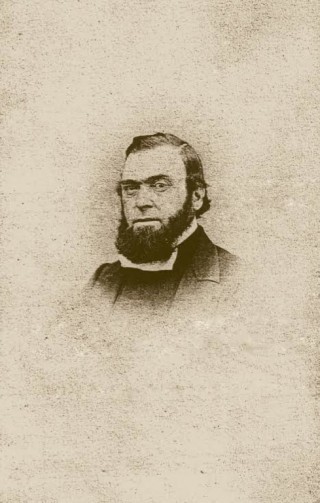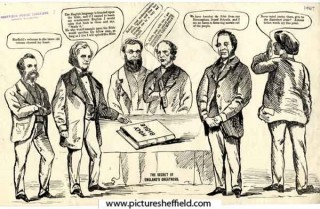Reverend Robert Stainton ~ Pastor, Politician & Preacher
Sheffield & Rotherham Independent, 1875 & Sheffield Daily Telegraph, 1868
Transcribed by Joey Xu
The Rev. Robert Stainton was a highly esteemed preacher, both politically and religiously and was presented in the “Journal of Literature, Science and Art” (The Sheffield Portrait Gallery) in May 1875.
The articles below highlight public’s support and recognition towards his highly regarded reputation and labors.
SHEFFIELD AND ROTHERHAM INDEPENDENT, TUESDAY, MARCH 30, 1875:
“REV. R. STAINTON PUBLIC TEA
The Temperance Hall was well filled last evening, when the Rev. R. Stainton’ s public tea in connection with his Sunday afternoon services was held, followed by a lecture entitled, “Coloured Spectacles.” In the absence of Alfred Allott, Esq., who was to have presided, but was unable to attend owing to the sudden illness of his aged mother, Mr. Robertson was called upon to occupy the chair. He read his financial statement for the past six months as to the Sunday afternoon services. Before doing so, however, he said he was glad to observe that this had been one of the most successful years spiritually they had had, inasmuch as very many souls had been gathered to Christ through those services. (Hear, hear.) The statement showed that the collections at the door of the Albert Hall amounted to £147, 14s. 2d. The payments were:–Rent of hall, £96, 12s.; widows and orphans, after the Warren Vale explosion £5; Town Mission, £5; printing, &c., £25 (which £15 was for hymn books which were given away); total, £131. 12s.; leaving a balance in hand of £16. 2s. 2d. (Applause.)—The Rev. R. Stainton supplemented this statement by remarking that the gatherings at the Albert Hall on Sunday afternoons had been larger during the last six months than during any other similar period for the last ten years. Not only had there been, by the Divine blessing, more substantial good effected, but large numbers had signed the temperance pledge without being asked, and others had found their way to places of worship. The Sunday afternoon service in Sheffield was the only one in England that, he believed, supported itself; and whereas in the metropolis and elsewhere such services were supported partly by voluntary subscriptions, the people of this town showed they were independent enough to pay for what they got—(laughter)—and they were the better enabled to enjoy it. (Applause.)—Mr. Kenyon moved that the balance in hand should be handed over to the Rev. Mr. Stainton, not as payment for his labours, but as an encouragement. (Applause.)—The Rev. Mr. Brown seconded the motion, and it was passed with acclamation. —The gift was briefly acknowledged by the Rev. Mr. Stainton, who afterwards delivered his lecture. It was a thoughtful, and at times humorous, description of the various characters met with in everyday life, as represented by the different colours of glass, such for instance as the jealous man, whom he described as the “green-eyed monster.” He generously excluded all reference to the fair sex, as he did not suppose there were any jealous ladies present. (Laughter.)—Other portraits were drawn in an artistic and pleasing style, and the proceedings closed with the usual votes of thanks. During the evening the choir sang several of Mr. Sankey’ s hymns, the audience joining every heartily in the choruses.”
THE SHEFFIELD DAILY TELEGRAPH, WEDNESDAY, SEPTEMBER 2, 1868:
“STAINTON’ S REPUTATION
THE REV. MR. STAINTON AND OURSELVES.
We beg to call attention to the following correspondence:–
3, Hartshead, Sheffield, 29th August, 1868
Gentlemen,–In your paper, the Sheffield Daily Telegraph, of the 28th July last, there appears a letter headed, “A quid pro Quo,” and signed “No Cat’s Paw,” which contains the following passage, alluding to the Rev. Robert Stainton:–
“Some curiosity has been excited in Sheffield as to the motives of the Rev. Mr. Stainton’ s prominence in political matters. I remember that shortly after the close of Commission and Mr. Stainton’ s championship of those innocents Messrs. Broadhead and Crookes, the reverend gentleman met a friend of mine, in one of the streets of Sheffield, and showed my friend a cheque for £ 100, adding boastingly, ‘You see some people approve of what I am doing.’ He, however, so held the cheque as to conceal the name upon it. I believe it is now pretty generally known from what quarter the £ 100 had proceeded; and it is natural, perhaps, that the rev. gentleman should prove the truth of the text, that ‘the labourer is worthy of his hire.’”
The imputation therein contained has been renewed in the Telegraph from time to time, since the above mentioned date, in various and even more offensive forms.
You must be aware from statements publicly made by Mr. Stainton and otherwise that the true facts connected with the £100 in question are, that he did receive that sum for his chapel from some one in the town, but not in the form of a cheque, and applied it to the purpose or which it was given, and that the reference contained in the above quotation, and since then in various forms, amounts to an imputation of fraud or corruption on the part of Mr. Stainton totally without foundation and is a gross libel upon his character, for the publication of which you are responsible, and which, as the mater really has nothing whatever to do with the coming election, cannot be excused under the plea of election excitement, although every allowance is made for that.
We are therefore instructed, by Mr. Stainton to require that you publish in the Telegraph of Tuesday and Saturday next an ample apology to him, approved by us, for the wrong done to him by the imputations contained in your paper as we have mentioned, and an expression of your assurance that the money in question was paid to and duly applied by him on behalf his chapel.
We are, gentlemen, your obedient servants,
PYE-SMITH and SON”.
References;
1. British Newspaper Archive











No Comments
Add a comment about this page